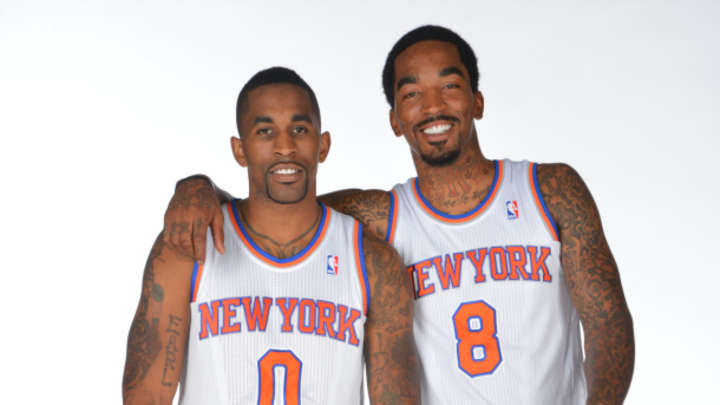Knicks paying over $2 million for J.R. Smith's brother to play in D-League

Chris Smith has his brother, J.R., to thank for his contract with the Knicks. (Jesse D. Garrabrant/NBAE via Getty Images)
Chris Smith, the younger brother of Knicks guard J.R. Smith, is an NBA player in only the most superficial sense possible. He is definitively the worst player in the league, so far removed from the NBA's demarcation line that even his inclusion on New York's Summer League team was quite obviously awry. His invitation to Knicks training camp was not a move made with basketball in mind, and his inclusion on New York's regular season roster stands as a blatant appeasement of Smith's older -- and far more talented -- brother.
It's not unusual for teams to go to great lengths to entice free agents back and keep them happy, but there's a clear, distinct boundary between compromising with another party and compromising basketball sensibility. With the decision to sign Smith, the Knicks grooved over that line to a little ditty by J.D. and the Straight Shot. Their more general disregard for the value of a roster spot and a dollar may well be unparalleled in the NBA, and -- as laid out by Marc Berman of the New York Post -- their penchant for nepotism will in this case cost them upwards of $2 million:
Though the Knicks haven’t yet reached the tax status as “repeat’’ offenders, they are so far over the luxury-tax threshold, the last few spots on their roster are costing them a fortune. Each additional contract dollar is taxed by a ratio of 3.25. The Knicks’ payroll stands at more than $87 million and the tax threshold is $71.7 million.
Hence, the Knicks are paying Smith his minimum contract of $491,000 and have to pay the league’s escrow account an additional $1.6 million in luxury tax, equaling about $2.1 million. Because of a favorable quirk in his contract, the whole sum became fully guaranteed on opening night.
The fact that Smith's salary was fully guaranteed at the outset of the season (for the second straight year, per Mark Deeks) is as blatant a marker of foul play as you could hope to find in this case. Fringe NBA types who earn a roster spot in training camp simply don't draw that kind of guarantee. Touré Murry, for instance, earned a spot on New York's roster through his play in Summer League and training camp and received no guaranteed salary at all for the 2013-14 season. C.J. Leslie and Jeremy Tyler, both of whom have already been waived by the Knicks, were given partial salary guarantees in similar circumstances. That Smith -- a collegiate role player a year removed from organized basketball with no NBA, D-League, or professional experience whatsoever coming off an unimpressive Summer League showing -- would somehow command a guaranteed, $490,180 salary is beyond explanation.
As Berman points out in his story, the Knicks have penciled Smith to join the team's D-League affilifate once the season begins Nov. 22, making him the highest-costing player in league history.
These are the Knicks, and this is how they operate. Power to them, I suppose; every dollar of Smith's salary is James Dolan's to spend, and the lost opportunity in Smith's occupied roster spot rightly theirs to squander.

Rob Mahoney is an NBA writer dedicated to the minutiae of the game of basketball, its overarching themes and everything in between. He joined the Sports Illustrated staff in 2012.